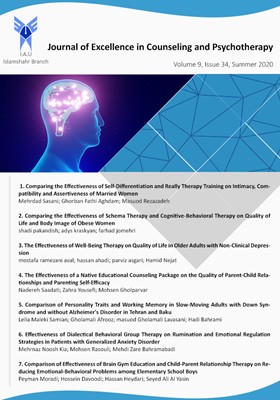Comparison of Personality Traits and Working Memory in Slow-Moving Adults with Down Syndrome and without Alzheimer's Disorder in Tehran and Baku
Subject Areas : Journal of Excellence in counseling and psychotherapyLeila Maleki Samian 1 , Gholamali Afrooz 2 , masuod Gholamali Lavasani 3 , Hadi Bahrami 4
1 - PhD Student, Department of Psychology, Faculty of Literature, Humanities and Social Sciences, Islamic Azad University, Science and Research Branch.
2 - Distinguished Professor of Psychology and Exceptional Child Education, Faculty of Psychology and Educational Sciences, University of Tehran, Tehran, Iran.
3 - Associate Professor of Psychology, Faculty of Psychology and Educational Sciences, University of Tehran, Tehran. Iran
4 - Professor of Psychology, Faculty of Psychology and Educational Sciences, Allameh Tabatabai University, Tehran. Iran
Keywords: Personality traits, working memory, Clumsy Adults with Down Syndrome, Alzheimer's Disorder,
Abstract :
Purpose: The aim of this study was to investigate personality traits and working memory in slow-moving adults with Down syndrome with and without Alzheimer's disease selected in Baku and Tehran. Methodology: The present study was a "causal-comparative" post-event research in terms of quantitative method, applied purpose and data collection. The statistical population of this study includes adults with Down syndrome with Alzheimer's disorder and without Alzheimer's disease over 40 years, which is purposefully and accessibly available to 40 adults with Down syndrome in Baku, 20 cases of Alzheimer's disease and 20 cases without Alzheimer's disorder and 40 adults with Down syndrome in Iran (20 cases of Alzheimer's disorder and 20 cases without Alzheimer's disorder) were selected as a statistical sample. To collect the necessary information in this study, a personality traits questionnaire and working memory scale were used. Findings: The results showed that the differences between personality traits and working memory of slow-acting adults with Down syndrome with and without Alzheimer's disease in Tehran and Baku were significant, as well as the mean of personality traits, conscientiousness, flexibility, receptivity and Active memory in adults with Down syndrome without Alzheimer's disorder compared to adults with Down syndrome and Alzheimer's disorder in Baku was higher than in Iran except for neuroticism. Conclusion: Based on this, it is suggested that behavioral intervention programs based on cognition and mindfulness be designed and used in the field of strengthening personality traits and working memory for parents of children with Down syndrome and Alzheimer's disorder.
_||_


